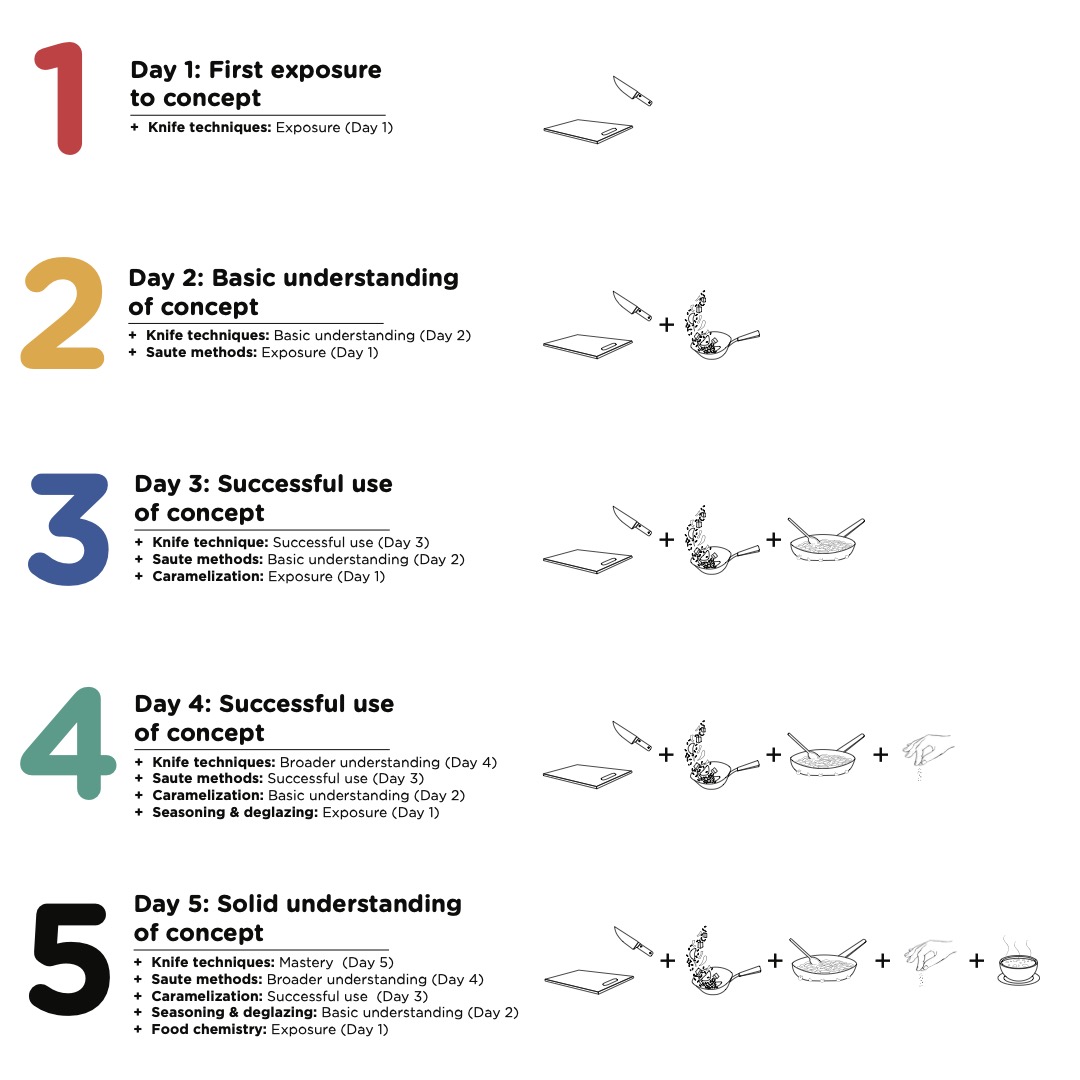Learning is not a task. It’s not a job or a chore. It’s an experience. At Code Fellows, students embrace learning a new skill through experiencing skill utilization with direct application rather than simply trying to grasp it mentally. Take this approach, and you’ll find that you gain confidence and practical use of that skill. You will be increasingly productive with the application of this new skill as your reliance on it grows.
People learn more, faster, when we stack knowledge on top of experience. This solidifies a new-found skill that becomes the foundation on which to stack additional more advanced skills. Welcome to stacked learning.
Imagine it’s your first day working in a kitchen and your Head Chef puts you on the task of doing some basic prep for their famous soup. They show you how to hold the knife so you don’t lose a finger, prepare the onion, and then dice it perfectly. And now it’s your turn.
When you’re all done, they look at your pile, direct you to the stove, and ask you to cook the onions until they’re “translucent”, then add a measured amount of spices, let it cook for 2 minutes, and pull it all off.
Invariably, you realize you didn’t dice your onion perfectly, so some of your pieces are larger than others, which caused the smaller ones to turn brown while waiting on the larger pieces to become translucent. Then your spices go in too late…and the whole thing is bitter. After a quick review, you take some mental notes and go home for the night.
The next day, your dicing is an order of magnitude better. Your onions are much more evenly diced, so off to the stove you go. In your excitement, you add the spices just a little bit too early. It all looks perfect, but again: the taste isn’t up to your Chef’s liking. And they give you a quick demonstration of proper saute technique and explain how spices get bitter if they have a chance to burn or overcook.
Now, on day 3, you’re really feeling good about this. Again, you cut your onions perfectly. At the stove, you’ve waited until they are exactly translucent, in go the spices, and 2 minutes later, you pull it off… but again, bitter! Now, your Chef comes and provides feedback on your technique one more time, having watched you from afar. It’s the flame. They explain to you that spices color the butter and the onions over time, but under the right conditions. If we singe them with too much heat, we lose them.
On day 4, now that you’ve got it all figured out and your technique is sound, your Chef adds just a bit of wine to your pan before you pull it off, it sizzles, steams, and “cleans” the pan. Wow! 2 minutes later the liquid goes in, we boil, and the soup is perfect an hour later. They tell you that the secret to all of that was that “deglazing” the pan helped to get every last bit of flavor from your brilliant saute.
On Friday, guess who is confidently making soup? You!

In just 5 short days, you learned knife technique, cutting consistency, proper saute methods, heat control, caramelization, seasoning, deglazing, and food chemistry. Not through lectures and study, but by doing it progressively better each day, building on your mistakes and your successes all while picking up new concepts and techniques along the way. Each day, you are operating on the edge of your skillset, struggling as you built on the previous day’s foundation, and each day you were corrected and guided using those foundations as the basis for growth and are now a part of your DNA.
Now, imagine this in the world of technology. There are thousands of things for you to know how to do in order to make a computer act in a way that it isn’t going to behave on its own. Just like cutting vegetables or learning to spice properly, the world of technology is built on basics, and those basics are the catalyst for amazing things.
It will be uncomfortable, but you will embrace the idea of having to execute a task with something you have just barely learned how to do, and may not even have a name for.
You’ll teach the computer how to take and update notes and bits of data, how to repeat tasks over and over (perfectly), and how to do those tasks, still properly, yet slightly different based on different conditions. At first, these things called variables (recorded bits of data), loops (repetition), and functions (behaviors) will seem like learning a foreign language, but just as you now know how to make a great soup, you’ll soon be making amazing web applications not because you memorized something you read in a book, but because you tried it, made corrections, and through guided practice and new concepts being introduced over time, created a new part of yourself.
We call this process “Stacked Learning”:
- Start with a basic skill and put it into practice immediately.
- Then use that skill as a new requirement for the next thing you’re going to learn at a “basic” level.
- And put itinto practice…
- Repeat!
Throughout multiple sessions, you’ll find that the thing you knew nothing about on day 1 is a core skill of yours by day 5. And that thing on day 2 that you thought was impossible? By day 6, you’ve got it down as well. Eventually, we’ll be stacking dozens of things in this manner, each of them becoming a part of your core skill set and a dependency on the next thing you are learning at the edge of your abilities.
Compare that to what you’re probably used to, which is trying to consume and execute one thing at a time. That probably felt pretty good because you think you “got it”… until the 3rd week when you forgot all about what happened in week 1. Why? Because you stopped using it every day.
Here at Code Fellows, we have created a learning environment carefully crafted to accelerate your learning: through doing. Immersive, active learning coupled with stacking up new skills is a game changer. Our mission? Ignite your passion to learn in a collaborative environment that will provide you with tremendous support.
Working closely with others on production-level projects will grow your skills in application architecture, software engineering, and perhaps most importantly, team and social growth. Your peers become more than just peers, they become community, friends, and can bloom into future professional opportunities.
This is a place where strong, positive, and healthy mindsets are built to conquer adversities that stand in your way. It’s a place filled with passion and motivation to help people succeed. Here, you are only limited by your own curiosity. What are you waiting for? Apply Today.

